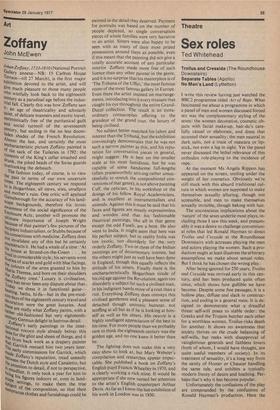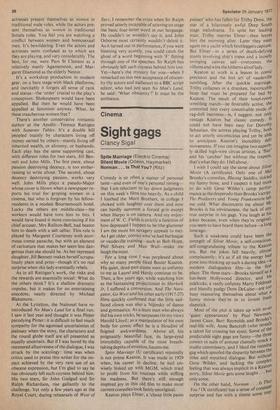Theatre
Sex roles
Ted Whitehead
Troilus and Cressida (The Roundhouse Downstairs) Separate Tables (Apollo) No Man's Land (Lyttelton)
I write this review having just watched the BBC2 programme titled Act of Rape. What fascinated me about a programme in which a panel of men and women discussed forced sex was the complementary styling of the sexes: the women decorative, cosmetic objects with facial make-up, hair-do's carefully casual or elaborate, and dress that accented their sexuality; the men neutral in dark suits, not a trace of mascara or lipstick, not even a leg in sight. Yet the panel never discussed the lethal relevance of this orthodox role-playing to the incidence of rape.
At the moment Ms Angela Rippon has appeared on the screen, smiling under the weight of her cosmetics. Obviously we're still stuck with this absurd traditional culture in which women are supposed to make themselves sexually alluring, though not accessible, and men to make themselves sexually invisible, though baking with lust. The unconscious implications about the 'nature' of the sexes underlie most plays, including those I saw this week, and presumably it was a desire to challenge conventional roles that led Ronald Hayman to direct Troilus and Cressida at the Roundhouse Downstairs with actresses playing the men and actors playing the women. Such a production might at least illustrate the arbitrary assumptions we make about sexual roles. But [think he has chosen the wrong play. After being ignored for 250 years, Troilus and Cressida was revived early in this century, and has been produced quite often since, which shows how gullible we have become. Despite some fine passages, it is a hollow play, diffuse and slack in construction, and ending in a general mess. It is designed to demonstrate what a dreadful threat self-will poses to stable order: the Greeks and the Trojans butcher each other for a worthless woman, Troilus risks death for another. It shows no awareness that
society thrives on the crude balancing of self-wills, but reeks with disapproval of vainglorious generals and faithless lovers (both of whom, I would have thought, are quite useful members of society). In its
treatment of sexuality, it's a long way from the sanity of Homer or Chaucer handling the same tale, and exhibits a typically modern frenzy of desire and loathing. Perhaps that's why it has become popular.
Unfortunately the confusions of the play are compounded by the confusions of Ronald Hayman's production. Here the
actresses present themselves as women in traditional male roles, while the actors present themselves as women in traditional female roles. You feel you are watching a conflict between women and homosexual men. It's bewildering. Even the actors and actresses seem confused as to which sex they are playing, and vary considerably. The best, for me, were Pam St Clement as a relatively manly Agamemnon, and Margaret Diamond as the elderly Nestor.
It's a workshop production in modern gear, on a bare stage with black platforms, and inevitably it forgets all sense of rank and status—the 'order' crucial to the play's conception. Shakespeare would have been appalled. But then he would have been appalled at feminism anyway. What, let these treacherous women free?
There's another conservative romantic author at the Apollo—Terence Rattigan with Separate Tables. It's a double bill peopled mainly by characters living off money earned by others—mainly living off inherited wealth, or alimony, or husbands. Each play has the same supporting cast, with different roles for two stars, Jill Bennett and John Mills. The first piece, about passion destroying decency, is too embarrassing to write about. The second, about decency destroying passion, works very well. John Mills plays a pseudo-Major whose cover is blown when a newspaper reports his trial for groping women in a cinema, but who is forgiven by his fellowresidents in a modest Bournemouth hotel. Lucky the others are middle-class--the workers would have torn him to bits. I would have found it more convincing if his chief accuser, Mrs Railton-Bell, had beaten him to death with a salt cellar. This role is played by Margaret Courtenay with enormous comic panache, but with an element of caricature that makes her seem less dangerous than she should be. As her repressed daughter, Jill Bennett makes herself scrupulously plain and prim—though it's no real surprise when this lady eventually rebels.
As in all Rattigan's work, the risks and the rewards are essentially social: What do the others think ? It's a shallow dramatic impulse, but it makes for an entertaining anecdote, neatly directed by Michael Blakemore.
At the Lyttelton, the National have reintroduced No Man's Land for a final run. I saw it last year and thought it was Pinter parodying Pinter: it is difficult to feel much sympathy for the agonised uncertainties of jealousy when the story, the characters and the round globe itself are all presented as equally uncertain. But if I was bored by the mannered allusiveness of the dialogue, I was struck by the scatology: time was when critics used to praise this writer for the impact achieved by the very rare use of an obscene expression, but I'm glad to say he has obviously left such coyness behind him. His two stars, Sir John Gielgud and Sir Ralph Richardson, rise gallantly to the challenge. Yet only a few years ago at the Royal Court, during rehearsals of West of Suez, I remember the crisis when Sir Ralph proved utterly incapable of uttering on stage the basic four-letter word in our language. He couldn't or wouldn't say it, and John Osborne most certainly wouldn't delete it. As it turned out in performance, if you were listening very acutely, you could catch the ghost of a word beginning with 'F' flitting through one of the speeches. Sir Ralph has obviously left such coyness behind him too. Yet—here's the mystery for you—when I remarked on this new acceptance of obscenity (by actors and audience) to a BBC script editor, who had just seen No Man's Land, he said : 'What obscenity ?' It must be the ambiance.











































 Previous page
Previous page